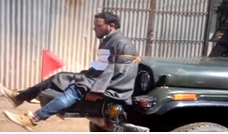The Indian Army, on May 22 announced that Major Mr. Leetul Gogoi has been awarded a commendation for his ‘sustained efforts in counterinsurgency operations.’ The Army Chief, General Mr. Bipin Rawat made the announcement. Gogoi tied a man, Mr. Farooq Dar, to his army vehicle, and used him as a a human shield against stone-pelting protesters in April this year, in Budgam, Jammu and Kashmir. The state’s police filed a complaint against Gogoi. But the army exonerated Gogoi prior to the tabling of a pending Court of Inquiry the incident, reportedly on reasons that his ‘actions were justified by the circumstances’.
 Exonerating, and often awarding officers who have committed serious crimes is not new in India. The practice is widespread across the system. Accountability of public servants, whether they are serving in the armed forces, or at the local police, or in other state services is rare in India. Impunity is the hallmark the Indian justice process. It is however incorrect to assert that no officers were punished for their wrong doings. But such instances are far and wide.
Exonerating, and often awarding officers who have committed serious crimes is not new in India. The practice is widespread across the system. Accountability of public servants, whether they are serving in the armed forces, or at the local police, or in other state services is rare in India. Impunity is the hallmark the Indian justice process. It is however incorrect to assert that no officers were punished for their wrong doings. But such instances are far and wide.
In fact, people’s trust in public institutions that have the mandate to record complaints, investigate cases, and prosecute offenders is at such low level, that many do not even complain. On the other hand, complaint making itself is a risky business in India, that once a complaint is made, the complainants receive no state support to be protected from threats from the offending officer or the state agency. The accused threatening victims and witnesses is also a common practice in India.
The difference between a state agency and a gang of criminals is, that for the state it can only act within the four boundaries set by the basic law. It is this legal requirement that places the state at a moral high ground, a constitutional duty, the state is bound to uphold, under all circumstances. The only source of legitimacy for state authority is that the state must at all times operate within the boundaries set by the law.
That criminal forces a state will be called upon to fight do not follow any law is no excuse for the state and its agencies to violate the law. In other words, no situation is an excuse or justification for an agent of the state to violate the law. This principle applies even when a state is engaged in a full-fledged war. Gogoi’s warrant in Jammu and Kashmir is to provide safety to the person and property of every person living in the territory where his unit is deployed, not to trample upon it, no matter what the circumstances are.
The casual and brazen way in which the Army has handled the incident has drawn sharp reactions from the victim, Farooq Dar. Dar has reportedly stated that the six-hour nightmare has left him traumatized, unable to continue working and still in physical pain, more than a month after the incident. He has said that he was ‘shattered’ at the commendation awarded to the Major and ‘wrong to expect any justice’. He has received no apology and has instead been subject to many justifications, reasons why the Major did what he did. A state condoning gross abuse of power by its agents operates with the same mindset of the criminal it is supposed to fight. Such state conduct has a deeper impact, that will demoralize the rank and file within its forces. A demoralized state force is the first threat to national security.
Impunity will not end conflicts. On the contrary it fuels it. Impunity is an onslaught upon fair trial and the rule of law. It is the negation of the basic principles of a democracy, that India claims it is. Awarding officers like Gogoi is an open affirmation by the Indian state that it promotes impunity for torture and other crimes committed by its officers.